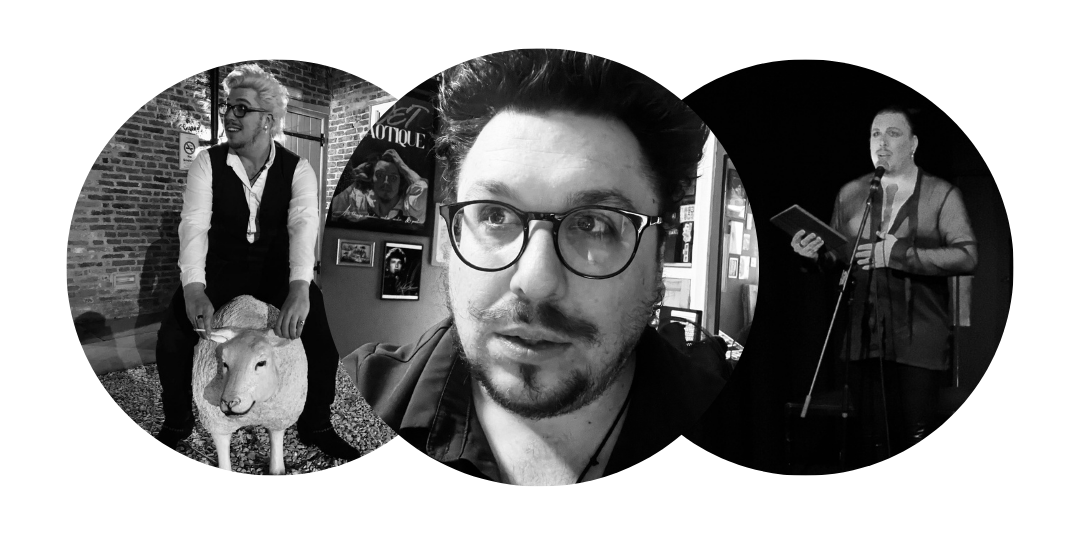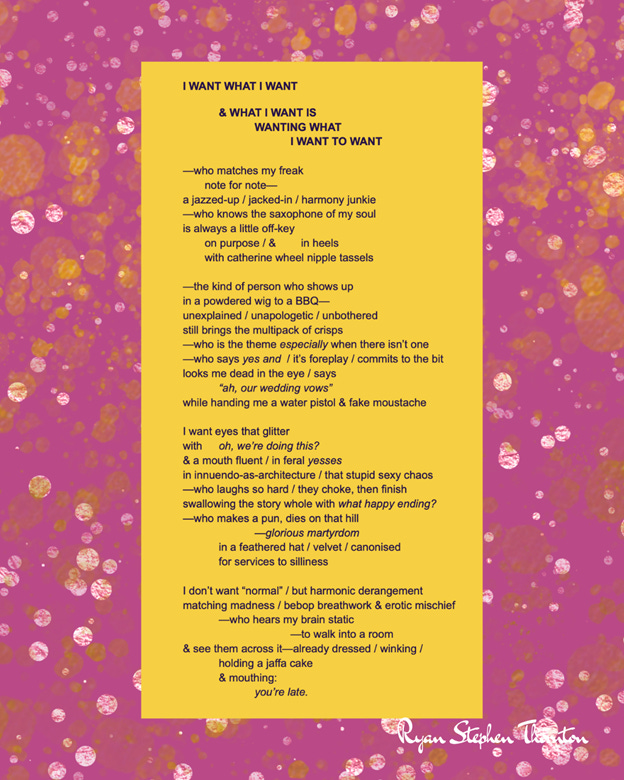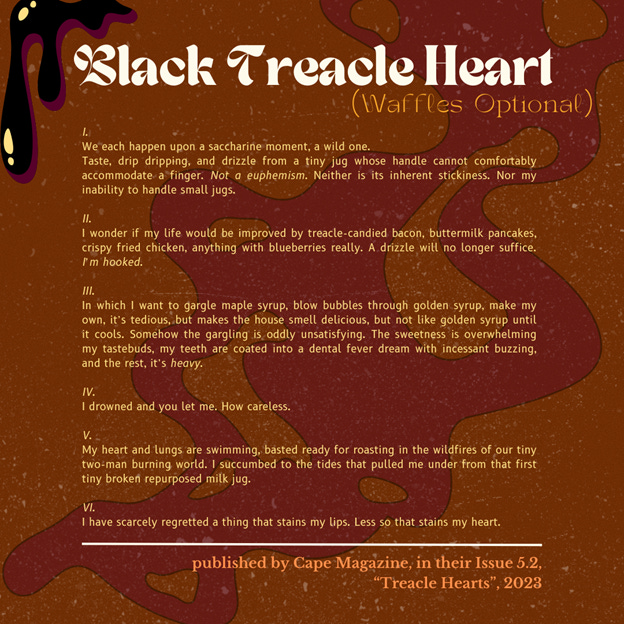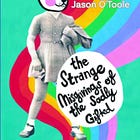Language Is a Skin & Other Textures You Can Rub Between Your Fingers by poet Ryan Stephen Thornton
a lyric essay on poetic practice.
poetic musings
Damn, this essay. Just, DAMN. I asked Ryan Stephen Thornton if he’d write me a lyric essay on practice, and he’s written a dream essay. I want to devour it whole daily. Such swoonworthy, alive writing. Such a sumptuous invitation into his poetry practice. So many tender, tender threads to follow. Poeting has been difficult lately and this, this sparks a small, poetic fire in me. I hope you all enjoy his work as much as I do; subscribe to his publication Poet Chaotique and purchase his book Salt-Rimmed Breath on Jazz-Thigh Gospel.
in gratitude,
Ryan Stephen Thornton is a bisexual, maximalist poet, performance-maker, and PhD researcher in Theatre & Performance at York St John University. His writing blends comedy, queerness, absurdism, and the poetics of everyday noticing into maximalist sprawl. He is the author of Salt-Rimmed Breath on Jazz-Thigh Gospel (2025) and the creator of Poet Chaotique, a Substack devoted to mischief, language, and excess. Find more of his work at Poet Chaotique.
My chair catches on the same snag of rug every morning. Small resistance, quiet percussion. I’ve learned to treat snag as metronome & stumbling as a door. I don’t start writing so much as accidentally fall into it, flitting between chorus-line dust motes, edging the kettle & calling its cathartic whistle a fettered scream. Rhythm first, sense later (or not at all.)
Virginia, ahoy! “it is all rhythm… A sight, an emotion, creates this wave in the mind, long before it makes words to fit it.” I read that as an instruction to listen with the knees. The wave hits; my calves answer. Words arrive panting after.
I keep a drawer of misheard phrases. Poetic friction. Mishearing isn’t a flaw; it’s a slip-road. A wrong word opens many a right door. Pattern-recognition does the rest: I’m just a switchboard operator connecting accidental calls. Carry two pockets: one for small astonishments; one for misunderstandings. Swap them when you forget which is which. Misread signs on purpose. CAUTION: WET PAINT // WET PAINT: CAUTION // PAINT CAUTION WET—three separate poems. Lament that they rarely provide you a bucket with which to wet it.
Barthes, our patron saint of delicious trouble, offers permission and a dare: “Language is a skin: I rub my language against the other.” I run phrases between my fingers like ribbons at a haberdashery. I thumb the nap of a sentence. I test edges for loose threads I can pull distractedly. If a word doesn’t graze, I swap it out for one with burr.
On Tuesdays, the street smells of fresh-cut limes versus snarling hot brakes. I inventory without blinking: gum fossilised to the pavement (spearmint, 2014); traffic cone crown on a statue; child dragging a stick across railings making an alphabet of kuh-lunk-a-dunks. I copy its swagger. Write a sentence that begins with a sandwich and ends with a constellation. Do not apologise for the bridge you had to build to get there. Alas, the bridge is the thing!
“If you were very, very small, smaller than a leprechaun, smaller than a gnome or a fairy, and you lived in a vagina, every time a penis came in there would be a natural disaster. Your dishes would fall out of the cupboards and break and the furniture slide all the way to the other side of the room. It would take a long time to clean up afterwards.”
― Mary Ruefle, The Most of It
I teeter between tempos. Kerouac in my ear: go—go—go; Woolf in the other: listen until the room rearranges itself. Koestenbaum is useful at the border: I want to reach a point where mania masquerades as regular, not unreal. Yes—let us pass for regular while smuggling fireworks under the coat.
Maximalism is not greed, it’s gratitude. Not “more more more” so much as “oh—also this.” A willingness to let the frame be porous. A sentence begins with a bus timetable and ends with a mouthful of dripping fruit, taking on three hitchhikers, & a musical instrument. It shouldn’t work; sometimes it doesn’t; but when it does, you can hear the sentences grin. I feel their mischievous breath against my neck. Commit too far. If the image asks for a pigeon, build it a coop. Not all the pigeons are real, one is an impostor… aaaaaaaaand spiral!
I don’t edit by subtraction so much as by tuning. I read aloud until the line sits right between the teeth. The mouth is a strict fingering trill on a brass-based blow-by-blow. If a phrase resists the bite, I replace it. A word that refuses the tongue is a word simply auditioning for another poem. Taste your drafts. Literally. Read them aloud with your tongue in your cheek. If a line can’t survive the mouth, it’s a filthy liar.
A daily exercise in pattern: I map the neighbourhood sounds as if they were a drum kit—bus-sigh bass, pigeon-feather hi-hat, branch snap crash, neighbour’s car-door slam snare. Once the kit assembles, I invite a phrase to play on it. Often the phrase isn’t ready. Often I am not. Rhythm is patient in a way meaning is not.
I trust repetition until collapse. Yes yes yes yes yes until the word sheds its wet coat of meaning & stands there by the fireplace as rhythm alone, naked as the day it was stripped of syntax. That’s when it belongs to the body, which is the best kind of belonging. Find one tiny thing and stare until it grows a history. Milk froth qualifies. So does a bruise. So does a tea stain in the shape of a country you’ve never visited.
There is a small, boring miracle on the kitchen counter: the way a spoon rests across a jar of honey, glinting like a minor saint. I note the angle, the meniscus, the way the afternoon does its soft theatre through the mottled glass. I also note that I am late, again, because noticing is a jealous child kept distracted.
A truth I learned from Hollie McNish & Lindsay Rush at the same table: the ordinary will confess if you give it another minute. The trick is to lower your voice until the ashtray tells you who it’s been with all night, to ask the unsliced bread what it thinks about mornings, to believe the cardigan knows the weather better than your phone. It sounds silly because it is silly. Silliness is a tool in the seriousness kit.
I report from bus stops more than I report from the desk. Two strangers performing a duet of deliberate non-noticing; the third character—silence with elbows—wedging in between. Rob Auton would ask the silence for its autograph. I settle for describing its shoes. Polished. Practical. Delirium with power.
On shame and show: there is always a moment I want to pare it down, to tuck & tweeze the glitter back into the jar. Restraint only looks good on other people. Then the fridge sings its F-sharp again and I remember the point: maximalism is a thank-you note to attention. If I’m going to err, let it be toward abundance.
If there’s a hinge, I keep it hidden until the hinge insists on squeaking. Not all poems need WD40. By then the page is already crowded: bus sighs, fridge hymns, sandwich tragedies, amber-quenched understudies, bureaucratic surrealism, domestic saints. I’ve delayed as long as I can. Here it is, then, the small motor behind the larger machine:
Wouldn’t it be funny if—
You can feel the pitch change when that arrives. The sentence leans forward in its seat; the paragraph puts its drink down; the day says go on, then. Sometimes the question is a prank. Sometimes it is mercy. Sometimes it is a little green door I open with my shoulder because both hands are full.
I don’t search for answers. I follow the tilt. When the question snags on a rug, I step harder. When it wants an encore, I give it a costume. When it grows teeth, I offer it my sleeve and let it sneeze.
Maximalism is not an argument. It is posture—arms flung, pockets open, tongue out, willing to be foolish for the sake of the voltage that runs through a good line. A poem, a paragraph, a shopping list: all acceptable conduits. Lyndsay Rush asks, “Why shouldn’t I”—and I have no rebuttal except to add, why shouldn’t you?
If the piece feels like a sitcom that refuses to cut to credits, that’s on purpose. I want the camera to keep rolling long enough for the prop table to confess, for the extra in the background to steal the scene, for the smoke alarm to deliver its cacophonous soliloquy. I want to discover, mid-sentence, that the door I thought was decorative actually opens.
So here—take this laugh I’ve been tending. It is not a punchline; it is a practice, a power source. Stand next to the rug-snag awhile. Let the room find its tempo. Rub language against the nearest life. When the amber understudy clears her throat, breathe with her. Ask quietly, then louder, then with both hands, Wouldn’t it be funny if— and don’t be surprised when the world answers in perfect rhythm.
invitation to guest post
I love honoring you, honoring your practices and poetics. Won’t you share them with me? unraveling, unmoored will soon be hearing from book artist, researcher, and educator Isabella Myers. Guidelines can be found on the About Page. Please message or email with questions.
unraveling, unmoored thrives on reader support; without you, we wouldn’t be here. We’d be somewhere else looking for you. We’d love to connect with more like-minded poets, artists, and practicing souls, and you can help us find them by talking us up in all of your digital and analog spaces and sharing this post with everyone you’ve ever met. With gratitude.
If this piece inspired you or otherwise spoke to you, consider upgrading to a yearly subscription or sending a one-time tip to unraveling, unmoored, so that we can keep publishing essays and interviews with amazing poets and artists.













God. Damn.
This piece is a riot of attention, and I mean that in the most reverent way. A sprawling, glittering map of how a mind like yours moves through language, rhythm, and the glorious debris of the everyday. Reading it feels less like parsing a written essay and more like sitting inside the writer’s synapses, each Shape a light-switch flipped mid-thought, illuminating not just ideas but the hum beneath them. It’s maximalist in all the best senses, playful, layered, messy-with-purpose, and absolutely electric with surprise. I’ll be carrying the phrase “maximalism is a thank-you note to attention” with me for a long time. You’ve made a practice of noticing, and of letting those noticings stack and ripple and spill over, not to be tamed, but to be trusted. This is what happens when the hinge squeaks and sings. So thank you. This electric sprawl, this joyous tangle. It is both celebration and subversion, a gorgeous ode to the sentence that dares to overstay its welcome just long enough to turn the prop table into a pulpit.